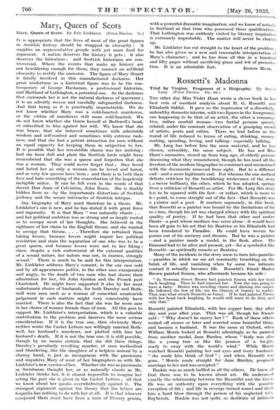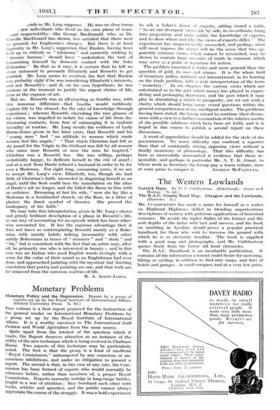Rossetti's Madonna
Trial by Virgins. Fragment of a Biography, By David Larg. (Peter Davies. les. 6d.) Tin other day Miss Violet Hunt wrote a clever book in her best vein of mordant analysis about D. G. Rossetti and Elizabeth Siddal. It gave us the impression of a disorderly, unhealthy domestic interior, with two figures in the foreground, one happening to be that of an artist, the other a consump- tive, rather morbid woman—two fretful persons queerly related, under the constant observation of a gossiping crowd of artists, poets and critics. There we had before us the round of life reduced to terms of eating, drinking, money- making, spending, loving, and talking—especially talking.
Mr. Larg has before him the same material, and he has chosen, ostensibly, the same subject. He has not Miss Hunt's memories, stored up from long ago, of elderly persons discussing what they remembered, though he has used all the freedom of the modern biographer to construct and reconstruct with the documents removed from sight. But to a different end—and a more legitimate end. For whereas the one method defeats criticism by the bewildering irrelevance of the story (acwever brilliant), the other, which he has adopted, springs from a criticism of Rossetti as artist. For Mr. Larg this story has to be squared with the fact—or rather,. which is more to h.s point, to come straight out of the fact—that Rossetti was a Fainter and a poet. It matters supremely, in this book, that Rossetti as a painter was bound by the limitations of his m:c ium, though his art was charged always with the spiritual quality of poetry. If he had been that other and earlier Dante—a poet whose medium was verse alone—it would have
been all gain to his art that his Beatrice or his Elizabeth had been translated to Paradise. He could have woven his poems out of his memory and dreams. But he was a painter —and a painter needs a model, in the flesh, alive. His
Damozel had to be alive and present, yet—for a symbolist like Rossetti—as spiritually remote as Beatrice.
Many of the incidents in the story seem to turn into parables —parables in which we see art constantly trembling on the brink of life, and vanishing when by some too intimate contact it actually becomes life. Rossetti's friend Madox Brown painted Emma, who afterwards became his wife :
"-In Newman Street Brown had painted Emma with her head. back laughing. Then he had married her. Now she was going to have a baby. Brown was mending chairs and darning the carpet. He followed the law of life, via the illusion of beauty to reality. That was what struck Rosietti as funny: If he had painted Emma with her head back laughing, he would still want to do that, and only that."
Rossetti painted Elizabeth, with her copper hair, day after day and year after year. :That was all, though his friends said : Why doesn't he marry her ? " Each of these others rushed off sooner or later and married some beautiful thing, and became a husband. It was the same at Oxford, when William Morris looked at Rossetti admiringly as he painted
from another model, Jane Burden, whose " body was slim like a young tree or like the pennon of a k-right, ready to sway with the world's wind." While Morris watched Rossetti painting her sad eyes and ivory forehead, " she made him think of God " ; and when Rossetti was gone, " Morris made straight for -Jane Burden," proposed
marriage to her and was accepted." Ruskin was as much baffled as all the others. He knew all that there was to be known about art. He understood exactly the relationship between the Beautiful and the Good. He was an authority upon everything with the possible
exception of life ; and life in revenge turned round and dealt him' a hard blow through the person of his neglected wife, Euphemia. Ruskin was not- quite so destitute of intimate .ends as Mr. Larg supposes. He was-on close terms
sew individuals who lived on his own plane of evan- ..ical .respgctability—iike George MacDonald, who, as Dr. Creville MacDonald has shown, was satisfied that there were no grounds for Euphemia's charges. But there is at least ingenuity in Mr. Larg's suggestion that Ruskin, having been held up to ridicule as " inhuman," and earnestly wishing to become human,"- should have " undertaken the task of humanizing himself by domestic contact with the Soho Bohemian." Be that as it may, it is certain that he left no stone unturned to persuade Elizabeth and Rossetti to get married. Mr. Larg seems to overlook the fact that Ruskin was probably right if he was considering Elizabeth's interests, and not Rossetti's—and At on his own hypothesis, he was anxious at the moment to justify the urgent claims of life, even at the expense of art.
But no. Rossetti was as all-exacting as Goethe was, with this immense difference—that Goethe would ruthlessly explore life to the utmost, for the sake of knowledge through experience ; whereas Rossetti, cherishing the rare gleams of his vision, was impelled to isolate his vision of life from dis- illusioning contacts, from fear of submerging it in realistic triviality or routine. Mr. Larg recalls the evidence of Lady Burne-Jones given in her later years, that Rossetti and his " young men " had " an attitude to women which made women feel like angels." " That which Christina had felt as she posed for the Virgin in the Girlhood was felt by all women who came, near Rossetti or near the men he inspired." Christina was a Rossetti too. She was willing, perhaps ecstatically happy, to dedicate herself to the role of angel ; and at a nod from Dante refused a husband in order to be for ever a Madonna. For eight long, consuming years, if we are to accept Mr. Larg's view, Elizabeth, too, though she had little of Christina's faith, succeeded in disguising herself as an angel, until the flesh could bear the immolation on the altar of Dante's art no longer, and she killed the flame in him with an embrace. Becoming at last his wife, " now she lay like a Madonna in a bombarded church, on the floor, in a litter of plaster, the finest symbol of disaster. She proved the inadequacy of his faith."
We may take this interpretation, given in Mr. Larg's choice and grimly brilliant description of a phase in Rossetti's life, as one way of accounting for an episode which has been other- wise accounted for. It has the supreme advantage that it does not leave us contemplating Rossetti merely as a Bohe- mian with untidy habits talking incessantly with other untidy Bohemians in terms of " stunners " and " slosh " and " tin," but is consistent with the fact that an artist may, after all, be primarily one who is interested in beauty ; and in this case was an Italian who used English words lovingly with a sense for the value of their sound as no Englishman had ever done,' and approached painting with the mystical but limiting conviction that poetry and painting are one, and that both are far removed from the common realities of life.
R. A. Scorr-JAmEs.

















































 Previous page
Previous page